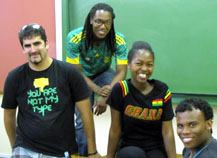 |
Preparing for the Berlin Championships are, from the left: Richard Chemaly, Zola Valashiya, Ros Limbo and Nkosi Mangali.
Photo: Linda Fekisi
20 November 2012
|
The UFS Debate Society will be taking on three major projects during the holidays. The month of December will be filled with activities for the team, with members taking trips to Grahamstown, Pretoria and Berlin, Germany to showcase their debating skills.
Their first project is a coaching session in collaboration with the Free State Schools Debating Board. The team will be coaching the provincial school teams and accompanying them to Grahamstown where they will compete in the National Schools Debating Championships in early December.
At around the same time, members will also attend the Pan African Universities Debating Championships that will be held in Pretoria. The PAN African Championship, which the team won in 2009, has expanded over the years and now also includes participants from Australia and the United States of America.
Towards the end of December, four members of the team will be heading to Berlin, Germany to compete in the World Universities Debating Championships. Ros Limbo, Nkosi Mangali, Richard Chemaly and Zola Valashiya will represent the university.
Zola, who is currently the chairperson of the debating society, has been part of the team since 2008. He describes being part of the teams as, “a growing experience. I have learnt a lot, especially how to be a critical thinker”. He was ranked among the top ten speakers in the English First Language division during the Kgorong 2012 National Universities Debating Championships earlier this year. Zola says the team’s goal is to gain as much experience as possible in order to offer training. They are looking at forming strong relations with various other debate societies across the country.